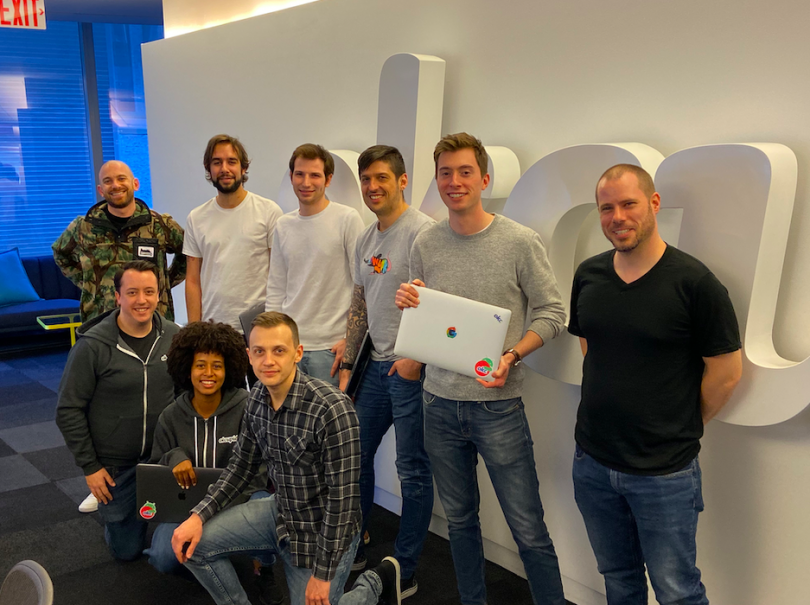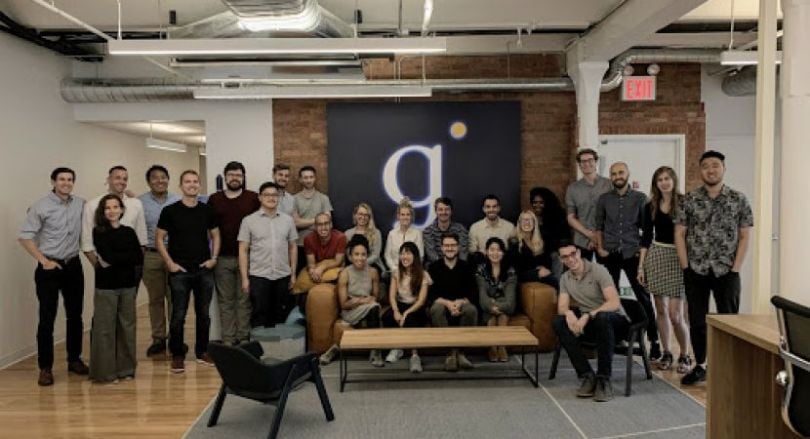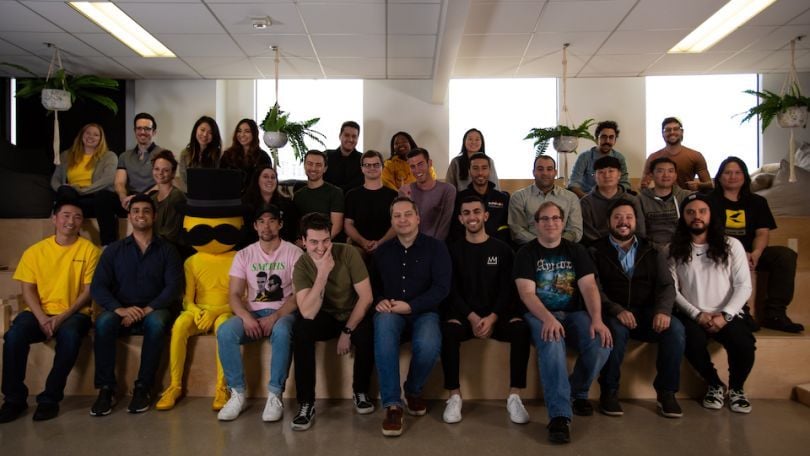In 1993, The Simon Personal Communicator, marketed by IBM and BellSouth, was the first mobile phone to add extra features. It was more than a phone; it was a pager, calculator, address book, fax machine and email device all in one.
It also weighed more than a pound and cost $900.
Consumers today use their phones for much more than calling and emailing. With the rise of digital wallets and high-speed internet through the 5G network, it’s more convenient than ever for consumers to shop through their phones. Business Insiders forecasts that mobile commerce will reach $284 billion and represent 45 percent of the U.S. e-commerce market by 2020.
Engineering Manager of Mobile Raquel Hernandez, agrees: “It's no secret that the convenience of mobile digital wallets is starting to become increasingly prevalent in both brick-and-mortar and online retail.”
Wallets aside, people also use their phones to find relationships, invest, upgrade their wardrobe, place bets on big games and more. And according to local mobile experts, these experiences are only going to become more interactive. How? Through machine learning, the 5G network, upgraded security and data protection tech, to start. Below, mobile industry professionals shared what trends they expect to be big for mobile in 2020, and how they expect these trends to impact the industry.
Mobile Trends To Keep An Eye On In 2020
- Foldable Devices
- Gestural Navigation
- Machine Learning
- Mobile Digital Wallets
- 5G Internet

OkCupid
Foldable phones may not be released to the mass market yet but Android Engineering Manager Joe Acosta predicts they'll soon be in everyone's pockets. Acosta added that bigger screens, pocketable devices and a heavy dose of AI and machine will all play a role in helping people make meaningful connections at OkCupid.
What are the top three mobile tech trends you're watching that are significantly impacting the industry?
First, the incoming wave of foldable phones. For consumers, this means bigger screens and more pocketable devices. For us, this means exciting developmental challenges, both creative and practical.
We’re also excited about gestural navigation. Navigating mobile phone interfaces using gestures is not a new concept, but with iOS and Android now both defaulting to gestures for interface navigation, our team is focused on ensuring a seamless and delightful experience while using OkCupid on both Android and iOS.
Lastly, machine learning. Many in the industry are leveraging machine learning and AI to solve tough problems. At OkCupid, we utilize these technologies to improve our product and help people make meaningful connections.
What under-the-radar mobile tech trends are you watching that the industry isn't talking about?
Developing mobile apps for emerging markets and ensuring users can access content quickly regardless of network conditions is one of our priorities at OkCupid and a trend that’s not getting the attention it deserves. At OkCupid, we’re rapidly expanding our user base around the world, so it’s vital we devote adequate time to ensuring quality in-app performance that creates a better experience for all our users.
"Many in the industry are leveraging machine learning and AI to solve tough problems.”
How are these trends affecting the future of your company specifically?
As mobile engineers, part of our role is to have extensive knowledge on the industry landscape to help us prioritize the work we do for our users and grow as engineers. It’s necessary to recognize what trends have meaningful value versus what trends might fade. While the future isn’t certain, we are committed to being adaptive and remaining innovative in this fast-paced, technology-driven world.

Rent the Runway
Engineering Manager of Mobile Raquel Hernandez said, “Customer experience is at the heart of our brand.” To apply that philosophy to mobile, Rent the Runway’s team is focusing on digital wallets, data-driven decision making and augmented reality to digitally create an in-store experience.
What are the top three mobile tech trends you're watching that are significantly impacting the industry?
Recently, the buzz is around machine learning and data-driven decision making to enhance customer experience. Customer experience is at the heart of our brand. Being able to personalize and customize an experience for each customer based on their past behavior is an old yet still trendy theme in technology.
Second, it's no secret that the convenience of mobile digital wallets is starting to become increasingly prevalent in both brick-and-mortar and online retail. The availability of Apple Pay, Samsung Pay and Android Pay is further reducing the friction of online payments in a mobile world. However, there are challenges around using mobile wallets for subscriptions and we're keenly watching how the industry ends up addressing these challenges for mobile subscriptions.
We're also closely watching the rise of augmented reality (AR) in mobile applications. The rise in hardware and software computing power in modern smartphones has been made more prevalent in recent years. The use of AR in mobile tech has been most noticeable in social media and mobile e-commerce. Ikea, for instance, is using AR to let users preview what a piece of furniture would look like in their home. It would be natural to lend a similar experience in apparel. Though we want our customers to be adventurous and excited about our various offerings, a simple “how it looks on me” experience can go a long way for them. Being able to bring that taste of in-store experience to their mobile device is something we're interested in exploring.
"We're closely watching the rise of augmented reality (AR) in mobile applications.”
What under the radar mobile tech trends are you watching that the industry isn't talking about?
This year will be the year of the 5G network. It's an excellent opportunity to take advantage and increase the performance of mobile experiences. We're continually looking for ways to improve how we work to ensure we uphold a high bar of quality and performance in the products we ship.
Second, ensuring user information safety is a top priority for everyone in the industry since the past decade. There will be a lot of innovation in this area.
How are these trends affecting the future of your company specifically?
To give customers access to a dynamic, living closet, technology has to be at the center of everything we do. It is imperative that we follow the latest mobile app tech trends and technologies closely, as innovation in this area will shape the future of our company.

Stash
Stash’s mission is to make banking and investing easy and accessible for the 99 percent. Kelly Morales, iOS engineer III, said that using Apple’s API and integrating Siri creates a custom experience she expects to see more in future apps.
What are the top three mobile tech trends you're watching that are significantly impacting the industry?
My main concern when building apps is creating the best experience for the user. Though this isn't mobile-specific, I've found design systems to be helpful in keeping designs and user experiences consistent. I've also found more and more apps relying on design systems. I look for apps offering new ways to promote personalization, whether it's something as simple as being able to select a color scheme or as nuanced as providing a custom feature.
What under-the-radar mobile tech trends are you watching that the industry isn't talking about?
I think many apps could improve their usability by leveraging Apple's API to its full extent. Supporting an app with Siri, having a custom experience based on a user's location or utilizing haptic feedback to reassure users their actions have been recognized are details that I think engineers should continue to explore. Similarly, we've moved to rely so much on stable networks that I get excited when I see a great offline experience offered in an app, and I think advances can be made in this area to encourage teams to consider that case more often.
"I look for apps offering new ways to promote personalization.”
How are these trends affecting the future of your company specifically?
At Stash, I work on the advice squad, which has the mission of providing personalized guidance to improve users' financial journeys. In the last year, Stash has made great progress around implementing a design system, ultimately streamlining efforts for designers and engineers. Having the extra bandwidth has given us the opportunity to explore more detailed designs like animations and haptic feedback, as well as user-specific experiences.

Tipico
As one of the biggest sports betting operators in Germany, Tipico believes it’s smart to bet on the future of esports. Managing Director Adrian Vella said the 5G network, online payment products and AI-based recommendations will make Tipico one of the go-to sports betting operators, especially as the company opens up more branches in the United States.
What are the top three mobile tech trends you're watching that are significantly impacting the industry?
5G internet will impact gaming in a major way. It implies faster, more dependable connections for smartphones, home internet and other devices such as gaming PCs and consoles. The benefits of 5G comprise of broader coverage, data transfer and lower latency. This might effect better quality casino games with bigger assets, better streaming experience on sports betting sites or more advanced match simulations.
In Tipico Germany, we have seen the success of AI-based event recommendations versus rules-based recommendations. There is still huge potential for more personalized content and smarter utilization of the small mobile screens, such as only displaying the player's content that is highly relevant to the user.
New online payment products have taken off in various parts of the world, but one of the places where it is most widely accepted is the U.S. As the U.S. sports betting market continues to open up, more online bookmakers will start to accept different valid payment options. The whole reason for this is to improve the customer experience and provide more secure and faster deposit and withdrawal options.
"5G internet will impact gaming in a major way.”
What under-the-radar mobile tech trends are you watching that the industry isn't talking about?
The eSports market is expected to register a compound annual growth rate of 20 percent during the forecast period of 2020-2025. According to the World Economic Forum, eSports viewers spent 17.9 million hours watching their gaming heroes on channels such as YouTube’s gaming channel or on Twitch in the first quarter of 2018. The eSports market is still in its infancy, yet with the growing viewership, it is expected to capitalize on the market in the future.
Idle games are an exciting new genre that is expected to expand greatly in the coming years on mobile. Idle games have risen on mobile because this is a genre that is perfect for modern mobile free-to-play design. The mechanics of idle games create perfect mobile sessions and drive strong long-term retention.
How are these trends affecting the future of your company specifically?
As any company grows, they have to adapt to the various trends affecting the market in order to continue to be successful. Here at Tipico, we believe that we are on the forefront of the industry and by using these trends we will enhance our products and our users’ experiences. As we open up our operation in the United States, we will have to use these market trends to stay competitive in this saturated space. Being on the forefront of using a more digitized payment system, enhancing our machine learning capabilities and using our innovative proprietary technology will help us stand out as a leader in the industry.

Galileo
Mobile phones make it easy to make health appointments and order prescriptions on the go. For Mobile Tech Lead Simon Manning, this trend signals the need to watch privacy and security data trends to protect patient information at Galileo. He explains how strong UX design and security are what patients look for in mobile technology.
What are the top three mobile tech trends you're watching that are significantly impacting the industry?
For years, mobile itself was the tech trend and “new hotness”; now, with a maturing market and development ecosystem and increasingly powerful devices in our pockets, we’re seeing use-cases that were previously confined to desktops with specialized hardware come to mobile platforms.
For one, I’m particularly excited by recent progress in mobile machine learning, such as with Apple’s MLKit and on-device neural processing units.
Also, the vast improvements to wearable devices and sensors, and what we can gain with that data, is equally exciting.
Last but not least, the renewed focus on user privacy and security is key as mobile software becomes more personal and integral in our lives.
What under-the-radar mobile tech trends are you watching that the industry isn't talking about?
Mobile development could be somewhat sketchy in its early days with crashes, slow performance and data loss common even in the most widely-used apps. But as the industry matures, users are developing much higher expectations when it comes to UX, visual design, software reliability and personal data security on mobile. Tech and product teams that don’t meet these expectations are at risk of losing those users to competitors that do like never before.
Accessibility also remains largely overlooked, despite some 57 million Americans having a disability of some type. Apple and Google have made great strides to improve accessibility features on their platforms, but developers must make it a priority and actually leverage those features to make a real difference.
"The renewed focus on user privacy is key as mobile software becomes more integral in our lives.”
How are these trends affecting the future of your company specifically?
As a healthcare company offering something new, Galileo’s patients are trusting us to provide them with the highest quality of care when they need it the most and we’re asking them to trust us with their most sensitive data to do so. The future of our company largely depends on earning and cultivating that trust, so nailing the user experience and reliability when our patients interact with Galileo couldn’t be more important.
It’s also critical to our mission to provide access to the highest quality health care to as many people as possible, including those with disabilities or impairments, so leveraging new accessibility tech is key for us.

Quibi
Quibi Principal Engineer Jeremy Klein said the reintroduction of foldable phones is something he’s watching, citing Quibi’s recently announced Turnstyle technology. The new tech allows streamers holding their mobile devices horizontally or vertically to switch between viewing experiences tailored for those orientations. Klein said adjusting to a phone with a unique viewing window could pose an interesting challenge for his team.
What are the top three mobile tech trends you’re watching that are significantly impacting the industry?
Three mobile tech trends I’m watching that significantly impact both Quibi and the industry as a whole are 5G, augmented and virtual reality and foldable devices.
5G is a game changer for connectivity speeds on-the-go. AR and VR experiences seem to get better and more immersive every time I try them. And new foldable devices like the revival of the Motorola Razr have me excited about the next generation of phone hardware.
"5G is a game changer for connectivity speeds on-the-go.”
What under-the-radar mobile tech trends are you watching that the industry isn’t talking about?
As an Android engineer and user, a couple of technologies that I’ve been following are things like Instant Apps and new sensor tech, like the Soli sensors in the Pixel 4.
Instant Apps can provide a smooth, native experience for websites when you don’t want to install an app for an hour to browse a shopping site, for example. Soli opens the door to some cool gesture-based features, but I think it’s still looking for that one killer application. I’m also always keeping an eye on Google’s Fuschia project, which has some interesting new approaches to the foundation of mobile operating systems.
How are these trends affecting the future of your company specifically?
The timing of 5G is perfect for Quibi. We’re creating premium, on-the-go video content and 5G will allow us to consistently provide the best quality possible at high speeds. Foldable devices have presented an interesting challenge for us to consider with our Turnstyle technology because it means some devices have unusual aspect ratios and the ability to drastically change aspect ratios while watching content.
While this isn’t something we are targeting now, I could definitely see the potential for diving into things like AR, VR and Soli down the line to create even more immersive experiences.

Lucky Day
Lucky Day CEO Josh Javaheri said mobile data security is an important topic he’s watching for the sake of his company’s users. Javaheri said scaling his data team is just one way Lucky Day will be boosting data security for their mobile users in the future.
What are the top three mobile tech trends you’re watching that are significantly impacting the industry?
Data. Companies need to improve how they manage their data. There’s no denying the obstacles that this has caused and will continue to cause companies. However, these changes will ensure that consumers’ information is safe.
With 5G expected to take off this year, mobile companies will need to change the way they create. Each generation becomes far more advanced than its predecessor, making it more difficult to catch up. 5G will change the tech industry in ways that we could never have imagined just two years ago.
Hyper-automation will also continue to affect the pace of technology and a part of that is machine learning. The next 10 years will be a time where “moving fast” is vital but the excitement of the future is clouding the difficulties to come. This may make or break tech companies, so now is the time to work toward the fast-moving future in tech.
"5G will change the tech industry in ways that we could never have imagined just two years ago.”
What under-the-radar mobile tech trends are you watching that the industry isn’t talking about?
In a world where all information is in our pockets, it’s difficult to identify what’s under-the-radar anymore. AI is certainly known, but as a startup in the tech industry, we’re watching it closely. It’s important to monitor how companies are using this technology and understand how it will affect businesses moving forward. Some companies are working toward AI changes in ways that haven’t crossed minds throughout the globe and we’re excited to see these new ideas.
How are these trends affecting the future of your company specifically?
As a mobile gaming app, it’s extremely important to us that we manage our data and use it appropriately and effectively. We’re growing our data team because our players and their information are important to us. We want to protect our data and we will continue to monitor the big data changes that are coming and act accordingly.
With ML, we’re learning more than ever and we’re learning quickly. We look forward to adding more developers and engineers to help us build something efficient and exciting for consumers.

Arity
Brian Busche, engineering manager of mobile SDK at Arity, doesn’t see the conversation surrounding acceptable mobile data tracking practices dissipating anytime soon. Instead, he recommends that users familiarize themselves with mobile components like anonymous identifier codes, or their phone’s Ad-ID. Companies must also do their part, he said, by following the most recent legal guidelines.
What are the top three mobile tech trends you’re watching?
We saw tremendous growth in Google Flutter last year. Some say it will eclipse React Native as a “hybrid” mobile development toolkit in 2020. Arity is looking to provide a software development kit that is compatible with non-native mobile apps. It will be tricky for third-party SDK developers to support all of the alternatives to non-traditional mobile development. I see the potential for added market fragmentation as more hybrid solutions arise. Success in this area means anticipating which hybrid framework to support now, and more importantly, six to 12 months from now.
Machine learning, which was once reserved for powerful back-end servers, is now becoming more viable for mobile. Processing complex models “on the edge” will extend AI’s reach deeper into the mobile app world in 2020. App publishers must consider the trade-off between compute cost and real-time data insights.
A third trend impacting the industry is the interconnectivity between mobile apps and other connected devices. We see apps connecting to smart homes, wearables and vehicle dashboard software like Apple CarPlay, Android Auto and proprietary original equipment manufacturer technology. This extends the capabilities of the mobile app, as it can relay data from a web of external sensors in addition to its own MEMS data. The implication for mobile developers would be greatly enriched data, set for more accurate insights into a user’s environment and behavior.
"I see the potential for added market fragmentation as more hybrid solutions arise.’’
What under-the-radar mobile tech trends are you watching that the industry isn’t talking about?
Apps are collecting data even when closed, which isn’t necessarily a bad thing. Arity technology enables mobile apps to detect the possibility that users have been in a collision event. This feature lives in family tracking apps, which can notify your circle that you have been in a collision and, if needed, can dispatch emergency services to your GPS location. Google has a similar solution, which is available exclusively for the Pixel 4. In every app that uses the Arity Driving Engine, users provide explicit permission to track location even when the app is closed.
Other third-party SDKs enable mobile apps to periodically send anonymous GPS data to companies for notifications like traffic alerts. Mobile users should not always assume that data, despite being anonymized, is used to their benefit. Legislation continues to evolve in the interest of protecting consumers’ personally identifiable information.
In 2019, we saw GDPR and CCPA define new rules about how data can be used. Mobile app developers in 2020 will need to be aware of these, and any additional government mandates, in order to legally use location data like GPS coordinates.
How are these trends affecting the future of your company specifically?
Arity has benefitted from these trends by staying ahead of the changes from a regulatory and ethics perspective while continuing to leveraging new technical capabilities. Because we so highly value user privacy and protection, we emphasize transparency and compliance.

Arrive
Elizabeth Lindemulder, VP of Product at Arrive, doesn’t need numbers to tell her that people are using their phones more than ever before. But data straight from the company’s product development efforts does confirm that reality. As we move through a world connected via text, talk and video, Lindemulder anticipates the continued rise of mobile pay options (including Arrive) as well as increased visibility surrounding apps that are potentially compromising.
What are the top three mobile tech trends you’re watching that are significantly impacting the industry?
We’re watching the rise of the “pays,” meaning Apple Pay, Google Pay, Amazon Pay, and PayPal. At the end of 2019, nearly 50 percent of our consumer app revenue came through one of these payment methods.
We’re also looking at users’ continual shift from web to mobile. In 2017, we doubled down on our iOS and Android product development efforts. We continue to see the results of that focus through growth in each platform. This growth has been key for us, as the lifetime value of our mobile customers far and away exceeds those booking via web.
Lastly, users are being more discriminative about the apps they allow on their phone –– whether they be battery hogs, data sucks or apps that compromise their privacy.
"We’re excited about people using their phones not only for payments but also as an extension of their identity.’’
What under-the-radar mobile tech trends are you watching that the industry isn’t talking about?
I wouldn’t say this is necessarily under the radar, but we’re excited about people using their phones not only for payments but also as an extension of their identity. More folks are using their phones to gain access to their homes or offices, unlock a Divvy bike, etc. Our mobile phones continue making life easier by removing everyday friction.
How are these trends affecting the future of your company specifically?
We’re offering an experience for consumers to get access to parking facilities using their phones.





